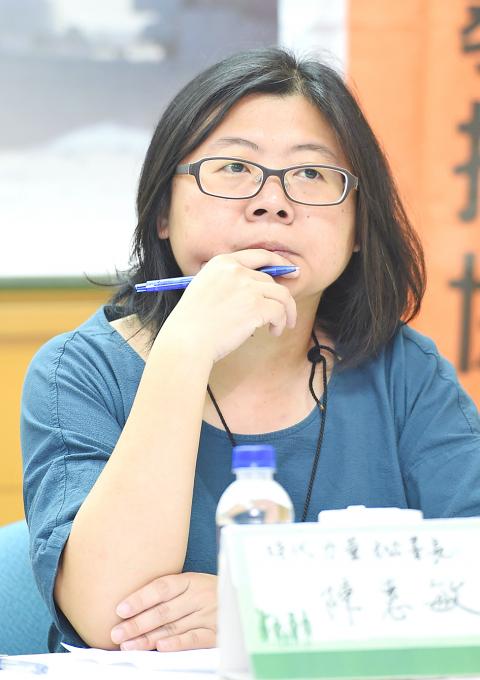Taiwan’s request to participate in this year’s International Labour Organization (ILO) conference has been rejected, marking another setback for the nation’s participation in international events, a New Power Party (NPP) official said yesterday.
The 106th session of the conference, a high-level annual event, is to be held in Geneva, Switzerland, from Monday through June 17.
NPP Secretary-General Chen Hui-min (陳惠敏) said the party was told that several International Trade Union Confederation unions and the Taipei-based Chinese National Federation of Industries (全國工業總會) have been excluded from this year’s conference.

Photo: Liu Hsin-de, Taipei Times
Union and federation representatives have been excluded on the grounds that the UN does not allow non-member states to take part in its meetings. The UN agency has 187 members.
“Union and federation representatives have taken part in the conference several times in the past few years,” Chen said.
Chen made the remarks at a meeting sponsored by the Taiwan Association of University Professors in Taipei, which discussed Taiwan’s exclusion from the World Health Assembly (WHA) last month.
Presidential Office spokesman Sidney Lin (林鶴明) said Taiwan has long participated in ILO meetings, and urged the organization to follow the precedent of letting union representatives take part in its events.
Meanwhile, Taiwan Association of University Professors president Lin Hsiu-hsin (林秀幸) said that Taiwan’s exclusion from this year’s WHA and uncertainty over whether a Taipei-Shanghai Forum would be held this year have underscored that China has been changing the mode of cross-strait exchanges over the past year.
The latest incidents “will not be the last,” she said.
Taiwan first attended the WHA as an observer in 2009, a year after former president Ma Ying-jeou (馬英九) came to power and pursued a more conciliatory China policy.
Taiwan had taken part in every WHA since then, until this year.
Its exclusion is widely seen as the latest move by China to obstruct Taiwan’s international participation, a strategy that has become more aggressive since President Tsai Ing-wen (蔡英文) came to power in May last year.
Cross-strait relations have cooled since Tsai took office, mainly due to her refusal to heed Beijing’s calls to recognize the so-called “1992 consensus” as the sole political foundation for cross-strait exchanges.
The “1992 consensus” — a term former Mainland Affairs Council chairman Su Chi (蘇起) admitted making up in 2000 — refers to a tacit understanding between the Chinese Nationalist Party (KMT) and the Chinese government that both sides acknowledge there is “one China,” with each side having its own interpretation of what “China” means.
Additional reporting by Su Fang-he

US President Donald Trump yesterday announced sweeping "reciprocal tariffs" on US trading partners, including a 32 percent tax on goods from Taiwan that is set to take effect on Wednesday. At a Rose Garden event, Trump declared a 10 percent baseline tax on imports from all countries, with the White House saying it would take effect on Saturday. Countries with larger trade surpluses with the US would face higher duties beginning on Wednesday, including Taiwan (32 percent), China (34 percent), Japan (24 percent), South Korea (25 percent), Vietnam (46 percent) and Thailand (36 percent). Canada and Mexico, the two largest US trading

China's military today said it began joint army, navy and rocket force exercises around Taiwan to "serve as a stern warning and powerful deterrent against Taiwanese independence," calling President William Lai (賴清德) a "parasite." The exercises come after Lai called Beijing a "foreign hostile force" last month. More than 10 Chinese military ships approached close to Taiwan's 24 nautical mile (44.4km) contiguous zone this morning and Taiwan sent its own warships to respond, two senior Taiwanese officials said. Taiwan has not yet detected any live fire by the Chinese military so far, one of the officials said. The drills took place after US Secretary

CHIP EXCEPTION: An official said that an exception for Taiwanese semiconductors would have a limited effect, as most are packaged in third nations before being sold The Executive Yuan yesterday decried US President Donald Trump’s 32 percent tariff on Taiwanese goods announced hours earlier as “unfair,” saying it would lodge a representation with Washington. The Cabinet in a statement described the pledged US tariffs, expected to take effect on Wednesday next week, as “deeply unreasonable” and “highly regrettable.” Cabinet spokeswoman Michelle Lee (李慧芝) said that the government would “lodge a solemn representation” with the US Trade Representative and continue negotiating with Washington to “ensure the interests of our nation and industries.” Trump at a news conference in Washington on Wednesday announced a 10 percent baseline tariff on most goods

THUGGISH BEHAVIOR: Encouraging people to report independence supporters is another intimidation tactic that threatens cross-strait peace, the state department said China setting up an online system for reporting “Taiwanese independence” advocates is an “irresponsible and reprehensible” act, a US government spokesperson said on Friday. “China’s call for private individuals to report on alleged ‘persecution or suppression’ by supposed ‘Taiwan independence henchmen and accomplices’ is irresponsible and reprehensible,” an unnamed US Department of State spokesperson told the Central News Agency in an e-mail. The move is part of Beijing’s “intimidation campaign” against Taiwan and its supporters, and is “threatening free speech around the world, destabilizing the Indo-Pacific region, and deliberately eroding the cross-strait status quo,” the spokesperson said. The Chinese Communist Party’s “threats